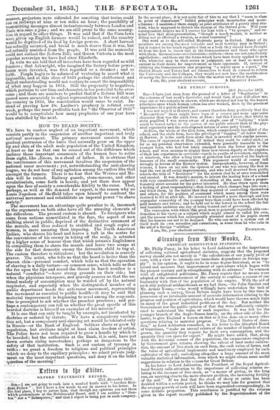HOW TO BEARD SOCIETY.
WE have to confess neglect of an important movement, which consists partly in the suspension of another important and truly national movement. The primary movement consists in the gradnal protrusion of the hairs that naturally grow on the upper lip and chin of the adult male population of the United Kingdom, at least so far as that can be coaxed out of the diffidence which inclines those important ornaments of the human face to retire from sight, like .A near, in a cloud of lather. It is obvious that the continuance of this movement involves the suspension of the
national razor movement ; yet, notwithstanding the anti-shaving league, we do not hear of any agitation among the cutlers like that amongst the farmers. There is no fear that the Weisses and Me- chis will be ruined. Railway guards, stone-masons, and other revolutionists, come forth in beards, and yet there does appear upon the face of society a considerable fidelity to the razor. That, perhaps, as well as the demand for export, is the reason why no Loris Napoleon of Sheffield takes upon himself to confront the universal movement and rehabilitate an imperial power "to shave society." The movement has an advantage quite peculiar to it, inasmuch
as the arguments on both sides have all the amusing elements of the ridiculous. The present custom is absurd. To foreigners who come from nations unmntilated in the face, the aspect of men Stalking about in public, deprived of the distinctive ornament of the muzzle, and thus reduced to stubbled and rough copies of women, is more amusing than imposing. The North American Indian, who shaves his head and leaves a tuft in the centre for the convenience of his enemy in takino.b off the scalp, is actuated by a higher sense of honour than that which actuates Englishmen in compelling them to shave the muzzle and leave two scraps at the side for that domestic enemy the favourite child to tug at. The custom therefore is ridiculous ; but the revolution is scarcely graver. The artist, who tells us that the beard is better than the shaven chin—personal comfort, which tells us that the operation of shaving is a daily torture—or common sense, which tells us that the fur upon the lips and round the throat in harsh weather is a natural " comforter "—have strong grounds on their side ; but when the physician interposes, and gravely assures us that the na- tional malady of consumption may be warded off by the natural respirator, and especially when the distinguished member of a public department heads the anti-razor movement, representing the movement as essential to public health—it may be said that material improvement is beginning to revel among the soap-suds. One is prompted to ask whether the preacher practises ; and per- haps a contemporary can tell us whether the great apostle of this bearded doctrine is himself an exemplar of his mission ?
'It Is one that can only be taught by example, not inculcated by doctrine or ordered by statute. We have a compulsory vaccina- tion act, but a compulsory anti-shaving act would be tolerated only in Russia—or the Bank of England. Soldiers shave or grow by regulation, but civilians might at least claim freedom of action. The Police have not been required to grow a handle by which to he'hearded ; but the authorities at the Bank, it is said, have put down certain rising moustaches ; perhaps as dangerous to the -safety of that institution. Such is our custom of tyranny in trifles : we grant a freedom to religious and political principles Which we deny to the capillary principles ; we admit private judg- 'nient -on 'the most important questions, and deny it on the toilet qiieStion of the morning !


































 Previous page
Previous page